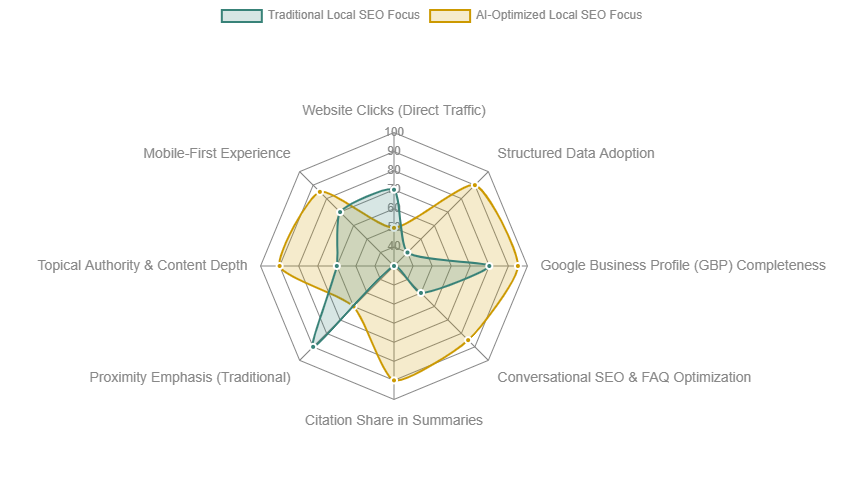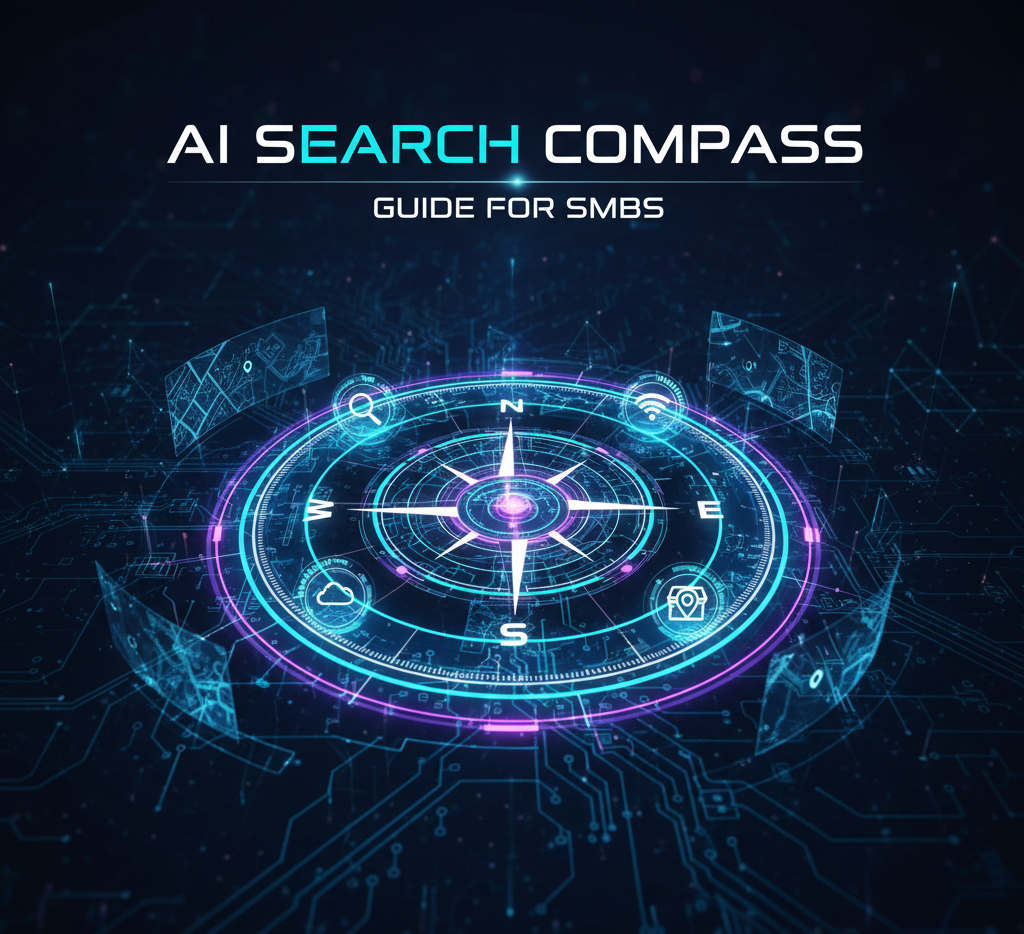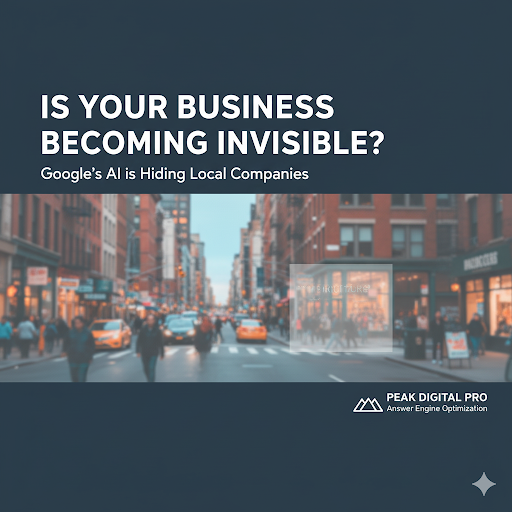Navigating The AI Frontier: Unlocking Local Business Visibility in an Evolving Search Landscape
Discover how AI-powered search summaries are reshaping how local businesses are found, and the essential strategies for thriving in this new digital era.
The integration of Artificial Intelligence (AI) into search engines is fundamentally reshaping how local businesses achieve online visibility. This "AI Frontier" introduces both significant opportunities and challenges, particularly through features like Google's AI Overviews and the broader influence of AI on local Search Engine Optimization (SEO) strategies. As of today, 2025-06-08, AI-generated search summaries are transforming how consumers discover and engage with businesses in their communities, moving beyond traditional link-driven results to prioritize concise, context-aware answers.
Key Insights into AI's Impact on Local Search
- Zero-Click Engagement: AI Overviews often provide comprehensive answers directly on the search results page, reducing the need for users to click through to individual websites, thereby shifting the focus from website traffic to direct citation within these summaries.
- Strategic Content Evolution: Businesses must pivot from traditional keyword optimization to creating structured, authoritative, and conversationally optimized content that AI systems can easily parse, summarize, and cite.
- Google Business Profile Centrality: Maintaining an accurate, comprehensive, and actively managed Google Business Profile (GBP) is more critical than ever, serving as a primary data source for AI-generated summaries and local search results.
The Dawn of AI Overviews in Local Search
AI Overviews, also known as AI-generated summaries or generative snippets, are prominent features appearing at the very top of Google Search results. These summaries synthesize key information from various web sources, including traditional web content and Google's Knowledge Graph, to offer immediate, comprehensive answers to user queries. Google began testing these summaries over a year ago and has since expanded their rollout to all users in the U.S., with plans for global expansion across multiple languages. Leveraging generative AI and custom Gemini models capable of multi-step reasoning, these overviews allow users to pose complex, nuanced questions and receive a summarized, AI-powered response, often accompanied by links for deeper exploration.
For local businesses, AI Overviews represent a new layer of visibility. When a user searches for something like "best emergency HVAC repair services near me" or "gluten-free pizza in Boston," an AI Overview might compile business hours, ratings, addresses, and even distill customer reviews into a brief narrative, all without the user needing to click on a website. This capability aims to make it faster and easier for users to find the information they need, potentially leading to increased user satisfaction and overall search engagement. Google reports a significant increase in usage for queries displaying these summaries, suggesting that satisfied users are more likely to conduct additional, related queries.
Artificial intelligence is increasingly integrated into business operations, transforming various sectors including local retail.
The Zero-Click Phenomenon: A Double-Edged Sword
While AI Overviews can enhance discoverability by surfacing relevant local information faster, they also introduce the significant challenge of "zero-click searches." Since these summaries often provide comprehensive answers directly, users may feel less inclined to click through to the original websites. This can lead to a reduction in direct website traffic, even if a business's content is prominently featured within the AI Overview. Businesses must adapt their strategies to ensure their content is not only included but also structured in a way that encourages further engagement or at least benefits from the brand exposure gained from the summary itself.
Shifting Focus: From Rankings to Citations
In the traditional SEO landscape, the primary goal was to rank first in organic search results. With AI Overviews, the success metric is evolving. Businesses now need to ensure their content is cited within these AI summaries. This means the emphasis shifts from merely having a high position in a list of links to having your business or content directly referenced and integrated into the AI's answer. AI systems often prioritize aggregated data from trusted, authoritative sources, making the quality and authority of your online presence paramount.
Proximity vs. Authority in AI Search
Early research suggests that AI Overviews may de-emphasize strict geographic proximity compared to the standard local pack. This means that while proximity still plays a role, a highly authoritative business with well-structured, relevant content might surface in an AI Overview even if it's slightly farther away from the searcher's exact location. For local businesses, this underscores the need to build broader topical authority and ensure content is semantically clear and easily parsable by AI systems, moving beyond just local address citations.
Strategic Optimization for the AI Era
To thrive in this evolving landscape, local businesses must adopt agile strategies that combine traditional SEO best practices with AI-specific optimizations. The goal is to ensure your content is easily digestible and citable by generative AI models.
Content Optimization for AI Readability
The way content is structured and presented is crucial for AI systems. Businesses should prioritize:
- Structured, Authoritative Content:
- Implement schema markup (e.g., Local Business, FAQ schema) and use clear hierarchical formatting (H1, H2, H3 headings, bullet lists, numbered lists). This helps AI systems extract specific pieces of information. Focus on answering detailed local queries and common questions customers might have, like "Do you offer same-day service?" or "What are your weekend hours?"
- Proactivity in Featured Snippets:
- Optimize content to appear in traditional featured snippets, as these are often sources that AI Overviews draw from.
- Conversational Language:
- As voice search and AI search grow, content should be optimized for natural language queries that mirror how users speak. Phrases like "Where can I find a gluten-free bakery near me?" or "How much does a plumber cost in my area?" should be directly addressed within your content.
Google Business Profile (GBP) Mastery
GBP remains the cornerstone of local SEO and is now even more critical as a primary data source for AI Overviews. Ensure your GBP is:
- Accurate and Comprehensive:
- Regularly update your business profile with detailed service descriptions, accurate hours of operation, high-quality photos, and relevant attributes. The richer and more verified your GBP data, the more likely AI systems will prioritize it.
- Review Strategy:
- Actively encourage authentic customer reviews that highlight specific services, unique selling points, and local experiences. AI models can parse these reviews and cite them within summaries, providing valuable social proof.
- Consistent NAP:
- Ensure Name, Address, and Phone number (NAP) consistency across your Google Business Profile, your website, and all other online directories (e.g., Yelp, Facebook, industry-specific listings). Inconsistencies can confuse AI systems and reduce your chances of being cited.
Local businesses are vital community pillars, and AI-driven visibility can help them reach more customers.
Mobile-First Strategies and Customer Experience
With the majority of online searches, especially local ones, occurring on mobile devices, a mobile-friendly website and seamless mobile experience are paramount. Additionally, AI can be leveraged to improve the overall customer experience, providing a competitive advantage. This includes deploying AI-powered chatbots for routine customer service questions and using AI tools to efficiently manage and respond to online reviews.
Leveraging AI Tools and Data for Advantage
The "AI Frontier" also means adopting AI tools to analyze data, predict trends, and optimize local SEO strategies. Small businesses, in particular, can leverage AI to level the playing field against larger competitors, automating tasks and gaining sophisticated insights without extensive resources.
AI-Powered Analytics and Optimization
AI tools are increasingly used to:
- Analyze Search Trends:
- Predict consumer needs and search patterns based on real-time data, seasonal trends, and local events. Tools like Google Trends can be invaluable for identifying what local audiences are searching for.
- Optimize Content and Listings:
- AI can assist in identifying gaps in content, suggesting optimal keywords (both traditional and conversational), and ensuring listings are fully optimized for specific geographic areas.
- Automate Tasks:
- From inventory management and demand prediction to optimizing delivery routes and assisting with marketing content creation, AI automation can significantly increase productivity and reduce costs for small businesses.
Monitoring and Tracking AI Overview Performance
Traditional SEO metrics like keyword rankings are no longer sufficient. Businesses need to focus on AI-specific metrics:
- AI Overview Appearances:
- Track how often your business or its content appears in AI summaries for relevant queries.
- Source Citations:
- Identify which specific websites or platforms (e.g., your website, Yelp, local news sites, review platforms) are driving mentions in AI responses.
- Geographic Performance:
- Tools like Local Falcon's Scan Explorer can provide heatmaps showing where AI Overviews trigger and your business’s presence in those specific areas.
- Search Console Performance:
- Monitor Google Search Console reports, which now log clicks from AI Overviews, to gauge how often your site's content is being summarized and clicked.
Here’s a radar chart comparing the strategic focus required for Traditional Local SEO versus AI-Optimized Local SEO. This visualization helps illustrate the shift in priorities for businesses aiming to maintain and enhance their visibility in the current search environment.
As you can see from the radar chart, AI-optimized local SEO places a much higher emphasis on structured data, comprehensive GBP, conversational content, and maximizing citations within AI summaries, even if it means a slight reduction in direct website clicks. Topical authority and overall content depth also become more critical than ever.
Challenges and Considerations in the AI Frontier
While AI offers immense benefits, there are also challenges that local businesses must be aware of and proactively address:
- Accuracy and Misinformation:
- Instances of AI-generated summaries containing misinformation or "hallucinations" have been reported. Inaccurate summaries could misrepresent a business's offerings, affecting its reputation and overall visibility. Businesses must ensure their foundational data is unimpeachable.
- Data Security and Privacy:
- Adopting AI systems often requires handling increasing amounts of data. Small businesses need to prioritize robust data security and privacy measures to protect sensitive customer and business information.
- Ethical AI Application:
- Ensuring responsible AI development and application, focusing on safety, transparency, and ethics, is crucial for building trust with consumers and search engines alike.
Mapping the AI Search Landscape for Local Businesses
This mindmap illustrates the core components and considerations for local businesses navigating the AI search frontier, highlighting the interconnectedness of AI Overviews, strategic optimizations, impacts, and essential tools.
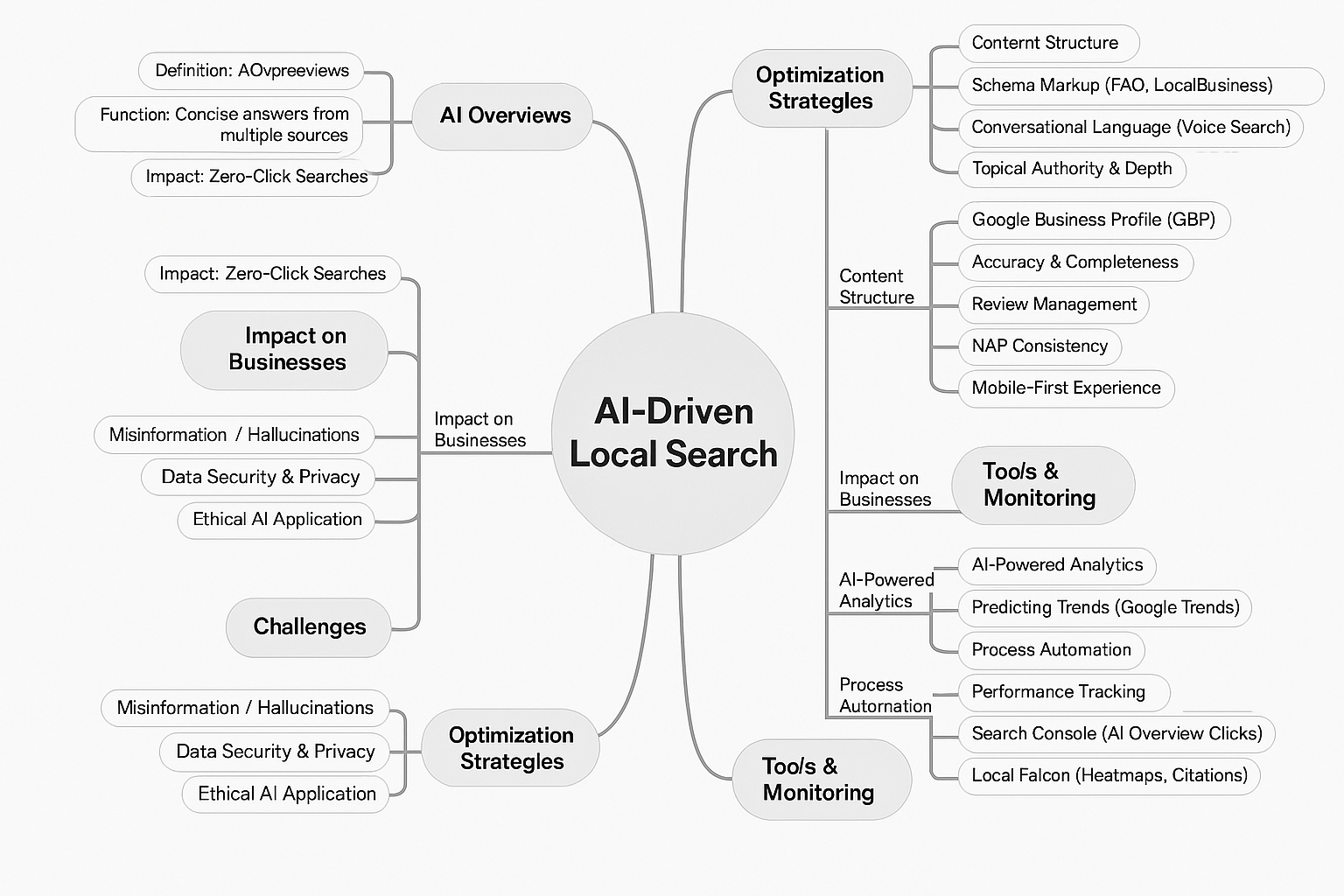
Deep Dive: AI, Voice Search, and the Future of Local Business Marketing
The following video provides an excellent overview of how AI and voice search are fundamentally changing the landscape of local business marketing. It elaborates on the concept that customers are increasingly interacting with search engines through voice commands rather than typing, which directly ties into the importance of conversational SEO and how AI processes these natural language queries. Understanding this shift is crucial for local businesses to adapt their strategies and ensure they are discoverable in this evolving environment.
A look into how AI and voice search are shaping the future of local business marketing.
Key Differences: Traditional Local SEO vs. AI-Driven Local SEO
To summarize the strategic shift, here's a table outlining the key differences between traditional local SEO practices and the emerging focus required for AI-driven local search summaries:
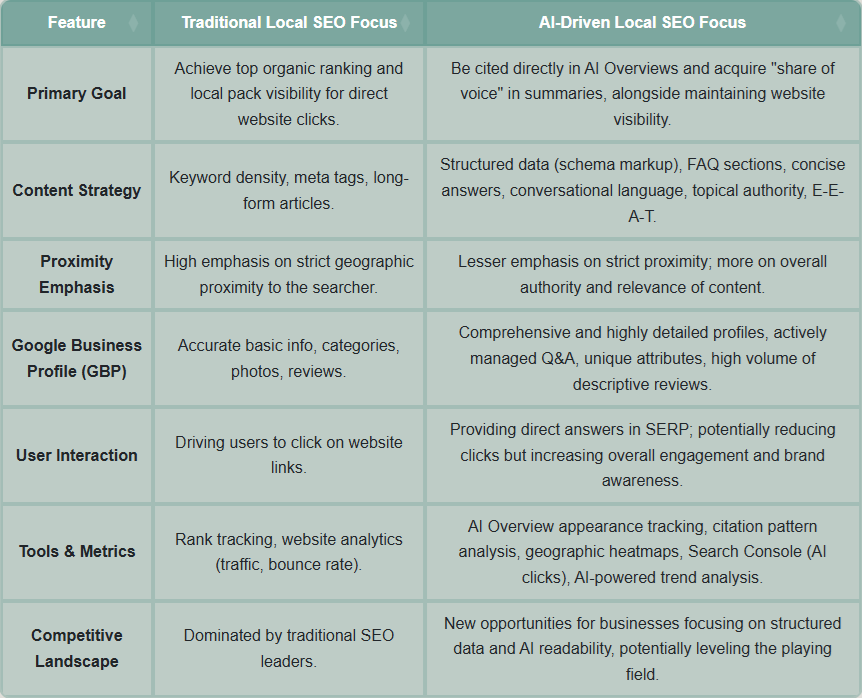
Frequently Asked Questions (FAQ)
What are AI Overviews and how do they impact local businesses?
AI Overviews are AI-generated summaries displayed at the top of Google search results, providing concise answers by synthesizing information from multiple web sources. For local businesses, they mean visibility shifts from traditional search rankings to being directly cited in these summaries, potentially leading to "zero-click" searches where users find answers without visiting a website.
How can local businesses optimize their content for AI search summaries?
To optimize for AI summaries, local businesses should focus on structured data (using schema markup like FAQ and Local Business), creating authoritative content that answers common questions directly, and adopting conversational language. Clear headings, bullet points, and well-organized information help AI parse your content effectively.
Is Google Business Profile still important with AI Overviews?
Absolutely. Google Business Profile (GBP) is more critical than ever. It serves as a primary, verified data source for AI Overviews. Maintaining an accurate, comprehensive, and actively updated GBP, including detailed service descriptions, hours, photos, and customer reviews, significantly increases the likelihood of your business being featured in AI summaries.
What are the main challenges for local businesses adapting to AI in search?
Key challenges include the potential for AI-generated misinformation or "hallucinations" that could misrepresent a business, the need for robust data security and privacy measures when adopting AI tools and ensuring ethical AI application. Additionally, the shift to "zero-click" searches requires businesses to rethink how they measure success and engagement.
Conclusion
The "AI Frontier" is not merely a technological advancement but a fundamental shift in how local businesses must approach their online visibility. AI-driven search summaries, particularly Google's AI Overviews, are reshaping user behavior by delivering immediate, synthesized answers directly on the search results page. This necessitates a strategic pivot for local businesses, moving beyond a sole focus on traditional rankings to prioritize being cited and integrated within these AI-generated responses. By embracing structured content, mastering Google Business Profile, optimizing for conversational language, and leveraging AI-powered tools for analysis and automation, local businesses can not only maintain but enhance their visibility and competitiveness. While challenges such as potential misinformation and data security exist, the proactive adoption and responsible application of AI strategies will be crucial for thriving in the dynamic digital landscape of 2025 and beyond.

